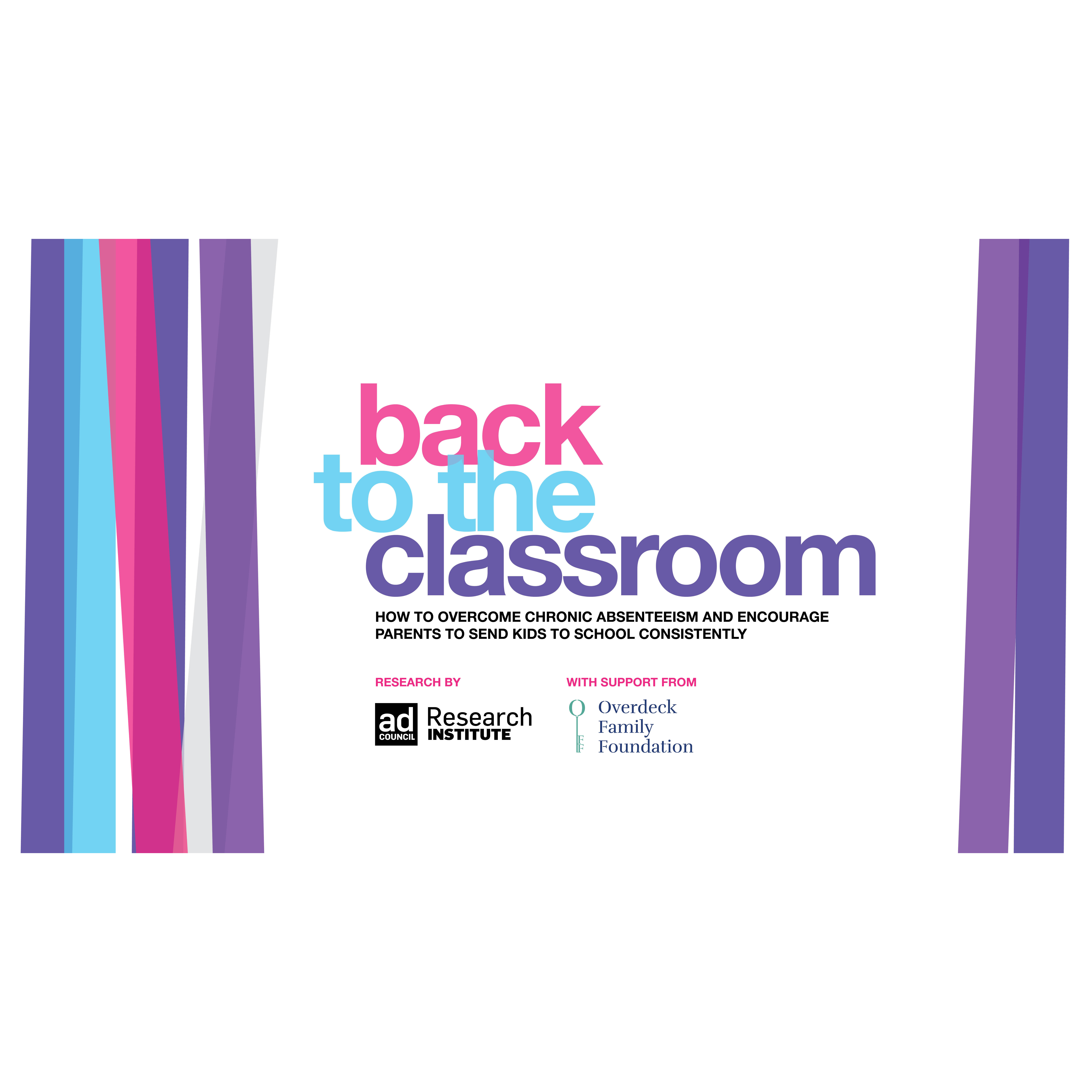New Toolkit Offers Updated Messaging to Address the Chronic Absenteeism Crisis in K-12 Schools

Since the COVID-19 pandemic, one out of every four students—or even more—have been considered chronically absent in U.S. school systems, meaning they missed at least two school days per month during the academic year. To combat the growing absenteeism crisis, a new study from the Ad Council Research Institute (ACRI), with support from Overdeck Family Foundation, provides guidance for how school leaders, educators, community partners, and others can more effectively encourage families to send their children to school on a consistent basis. Download the full report and toolkit, “Back to the Classroom: How to Overcome Chronic Absenteeism and Encourage Parents to Send Kids to School Consistently.”
“Chronic absenteeism isn’t new to the education sector, but it has significantly worsened since the pandemic. It’s clear that the way we’ve been communicating with families about attendance is no longer resonating,” said Lina Eroh, senior director of communications at Overdeck Family Foundation. “To ensure educators have access to messaging that breaks through, we partnered with the Ad Council Research Institute to better understand parents’ perceptions about in-person attendance and provide a messaging framework that the sector can use to encourage kids to get back to the classroom.”
Over the course of the summer, ACRI conducted a mixed-methods study examining more than 5,000 parents’ views on education and school absences. As part of this work, ACRI tested several message frames to determine the messaging that resonates with and motivates parents to send their children to school in person. Findings of the study revealed that messaging that chastises parents or only communicates the academic consequences of missing school is no longer effective in a post-COVID era. Messaging with a positive tone and a focus on the benefits of consistent in-person attendance, such as academic, social, and emotional growth, was ranked highest in terms of resonance. Examples of positive approaches to messaging are included in the toolkit.
Additional key findings include:
- Parents are significantly aware of and generally agree with the benefits of in-person learning, including collaboration, engagement, socializing, and personalized attention.
- Parents view the benefits of in-person school attendance holistically, with academics being only one piece of their child’s overall growth.
- Parents—especially those whose children are routinely absent—say they regularly track their children’s grades, school performance, and attendance. They tend to believe most absences are acceptable.
- Parents are most trusting of their child’s teacher and want to hear messages from them about why class attendance is crucial.
“This study has revealed just how important it is to provide holistic messaging around the impact of in-person learning for a child’s development, beyond just academics,” said Derrick Feldmann, lead researcher and managing director of the ACRI. “This messaging framework will help educators better reach parents of these students, encourage lower absenteeism, and help children become their very best and most whole selves.”
As the 2024-25 school year begins, the new toolkit and research report highlight a critical narrative change needed to shift parents’ knowledge, awareness, and behaviors around attendance. The updated messaging is designed to work in complement with the initiatives and interventions already underway in some states, districts, and schools across the country to address student absenteeism—from early warning systems to home visiting programs and nudges directly to parents and caregivers.
“Reducing chronic absenteeism has become a central issue for educators and communities. Addressing this issue at scale requires us to use emerging research showing what really works post-pandemic. The Ad Council’s research confirms what we have been hearing from practitioners, that we need to talk much more about all of the benefits that students gain—socially, emotionally, and academically—when they attend school regularly and in person,” said Hedy Chang, founder and executive director of Attendance Works.
“In Rhode Island, we have made improving school attendance a top priority because we know that students at all levels cannot learn, grow, and thrive if they are not in school consistently,” said Angélica Infante-Green, Rhode Island Department of Education Commissioner of Elementary and Secondary Education. “With our #AttendanceMattersRI campaign, cutting-edge attendance data tools, and our all-hands-on-deck approach, Rhode Island has decreased chronic absenteeism by nearly 10 percent since the height of the pandemic—but we know more work remains. We are appreciative of the new attendance-focused resources the Ad Council has created to support our work and that of school communities across the nation working to curb absenteeism and improve student outcomes.”
Live Virtual Event: To accompany the toolkit launch, the ACRI will hosted a webinar, featuring an in-depth research review led by Derrick Feldmann in addition to a panel discussion moderated by Lina Eroh. Experts and practitioners Dr. Robert Balfanz (John Hopkins University), Hedy Chang (Attendance Works), Angélica Infante-Green (Rhode Island Department of Education), and Dr. Todd Rogers, (Harvard University) will explore the implications of these findings for state, school, district, and community leaders and share strategies and best practices for encouraging positive attendance. Learn more here.
Posted at MediaVillage through the Thought Leadership self-publishing platform.
Click the social buttons to share this story with colleagues and friends.
The opinions expressed here are the author's views and do not necessarily represent the views of MediaVillage.org/MyersBizNet.

